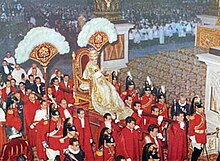
The Church of Rome claims that the Pope is the supreme head of the organized church on earth, meaning that anyone refusing that supremacy is by definition outside Christ. The Eastern Orthodox Churches, Oriental Independent Churches (such as the Coptic Church in Egypt), and Protestants have always refused and denied that supremacy.
Since the Bible alone, not the opinion of men, is the final standard in spiritual matters, that testimony alone must be the deciding issue.
The trail of logic in Roman theology holds that the Apostle Peter was given supremacy over the other apostles by Christ Himself in Matthew 16:17-19. After Christ's ascension, Peter moved to Rome and became bishop of the church there, where he revealed that his authority was to be passed by succession to all future bishops of Rome after him. So, the questions involved are, Did Peter receive supremacy over the other Apostles? Did he become a bishop, and, if so, was his diocese in Rome? And finally, did his supremacy succeed through the office of bishop in Rome, to all future popes?
On Peter's supposed supremacy, the essential portion is in verse 18, "I tell you, you are Peter, and on this rock I will build my church..." Jesus is making a play on words, for the name Peter, both in Greek and Aramaic, is the masculine form of the word for "rock." However, is Peter the rock He means? Jesus refers to Himself, and is referred to by the apostles , including Peter himself, as the chief cornerstone (Matthew 21:42, Ephesians 2:20, and I Peter 2:6-7). So, referring back to Himself as the rock would be consistent with Scriptural usage. Some interpret the rock as being Peter's confession of Christ. Either one meets the demands of parsimony far better than does the interpretation of Rome. In Ephesians 2:20, Paul even refers to the church's being built on the apostles as a group! Were the apostles, including Peter, simply confused? I guess the Church of Rome must know better than the apostles themselves did!
Further, what was the attitude of the other apostles to Peter? I believe that the testimony of Paul is especially telling. In Galatians 2, Paul is addressing the failure of Peter to oppose the intrusion of the Judaizers into that church. In verse 11, Paul tells us, "when Cephas ["Peter" in Aramaic] came to Antioch, I opposed him to his face, because he stood condemned." Paul didn't submit to some supposed supremacy of Peter. Rather, he opposed him to his face, and explicitly states that Peter was in error! Earlier in this same passage, Paul also mentions another point that throws a major monkey-wrench into Papal claims. One time each in verses 8 and 9, Paul refers to himself as the apostle to the Gentiles, while the other apostles worked among the circumcision, i.e., the Jews. Logically speaking, that is not consistent with a supposed bishopric of Peter in Rome. While a strong tradition supports the belief that he was martyred there, it would not have been an obvious place for Jewish evangelism and discipleship.
The claim that Peter then left his authority to his Papal successors is made of whole cloth, supposedly on the tradition of apostolic succession. That is, Rome claims that the evidence for their succession to Peter is authoritative because the popes have always held it to be. Such circular reasoning and self-aggrandizement is self-evident.
Of course, I would add a more-fundamental objection: as I have said before, the Bible knows nothing of the monarchical bishop, as practiced in the Church of Rome, the Eastern Churches, and the branches of the Church of England. If the office of bishop is a fiction, then any supposed authority passed through it is a moot point! I believe that the Bible vigorously and unequivocally maintains the Protestant view of Papal Supremacy, which is stated in the Westminster Confession of Faith XXV:6, "There is no other head of the Church but the Lord Jesus Christ: nor can the Pope of Rome in any sense be head thereof; but is that Antichrist, that man of sin and son of perdition, that exalteth himself in the Church against Christ, and all that is called God."




No comments:
Post a Comment